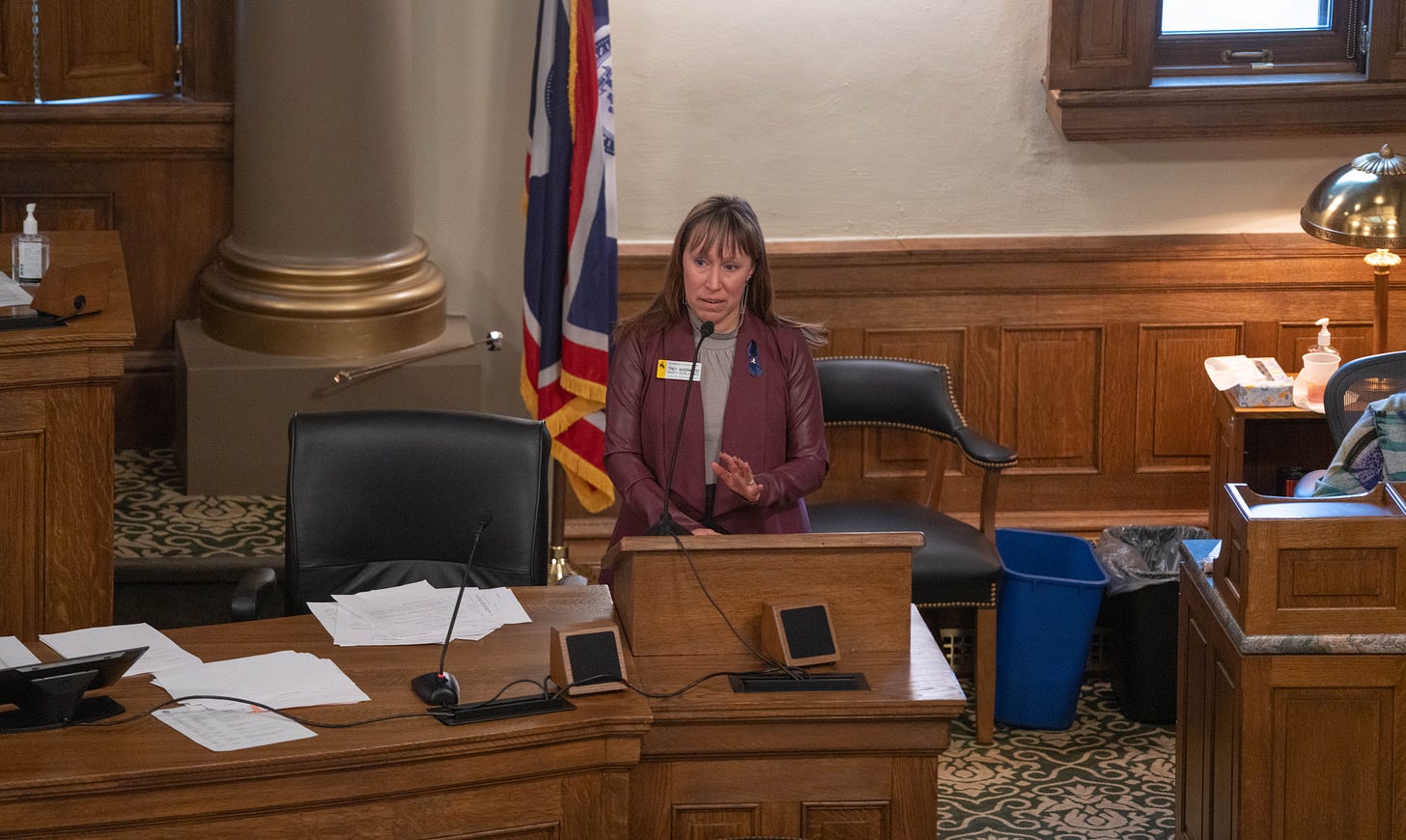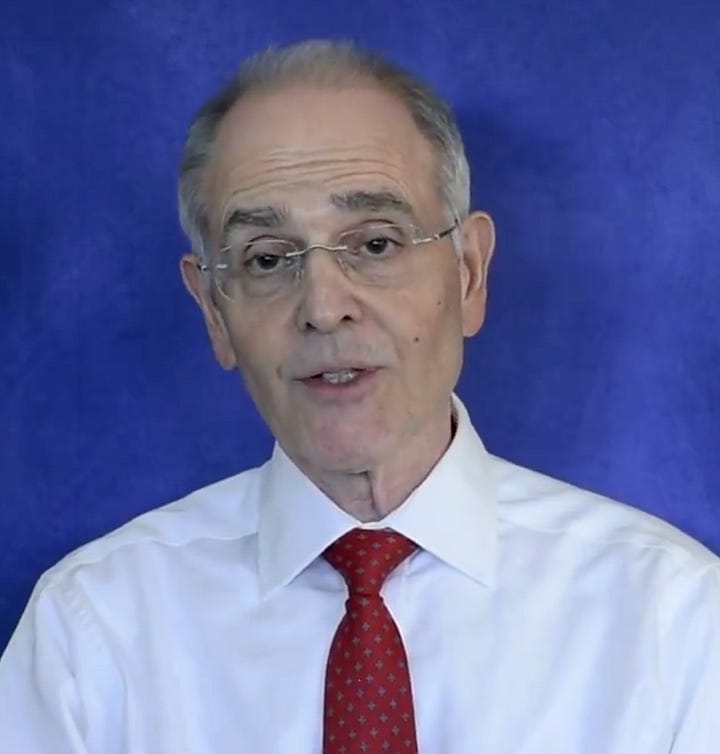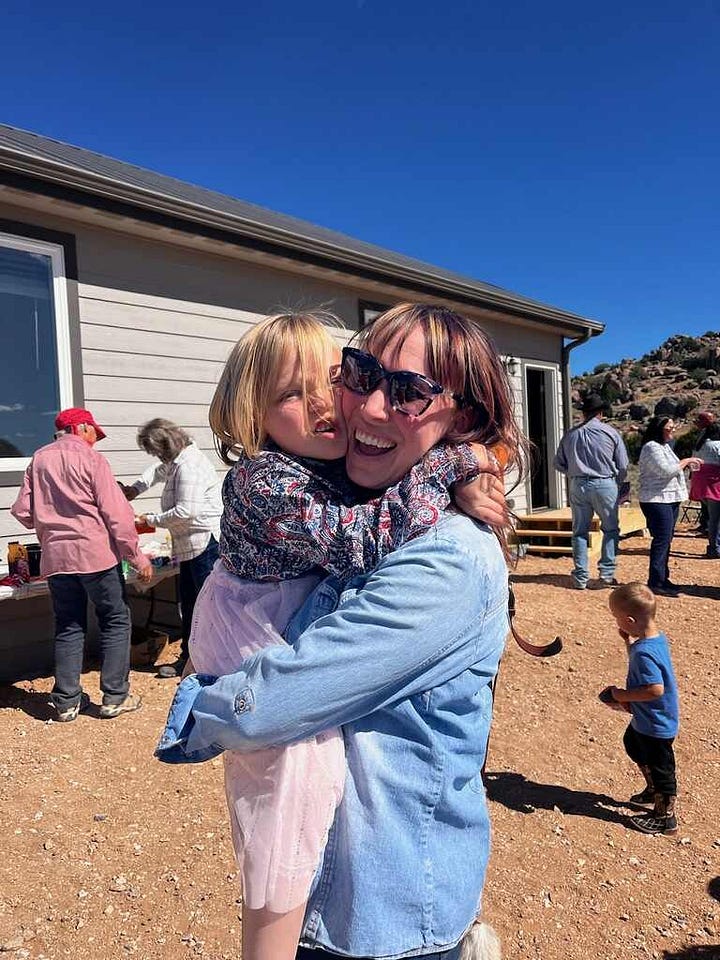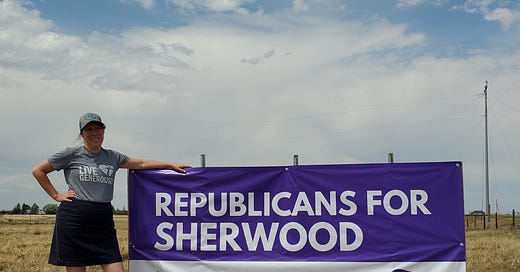In red-leaning House 14, conservative voters rally for Democrat Trey Sherwood
The two-term incumbent faces a General Election challenge from Republican Joe Giustozzi, but Sherwood says her record shows a willingness to listen and to fight for rural interests.
House District 14’s incumbent Democrat Trey Sherwood is seeking a third term in the Wyoming Legislature. She faces a challenge from Republican newcomer Joe Giustozzi, but is hoping her track record in Cheyenne will persuade voters in the majority Republican district to send her back.
Sherwood said her top priority will be halting the erosion of individual liberties.
“We talk a lot about freedom and freedom from government overreach, and that means different things to different people, but I think applying that value across the board is going to be really important,” she said. “And then honestly trying to get back to a more civil political tone I think is critical to the long-term success of our state.”
Wyoming’s 14th House District covers most of Albany County north of Laramie, including Rock River. It also cuts into Laramie to cover some of the city’s northernmost neighborhoods.
Until 2020, the district was consistently represented by the GOP. Sherwood flipped House 14 that year, in her first election, winning by fewer than 100 votes.
In 2022, Sherwood won by an even wider margin, by more than 300 votes, defending the seat from Republican challenger Bryan Shuster.
Sherwood said her repeat victories in the purplish-red district are “a testimony to our community coming out and voting for the person, not the party.”
In her first four years representing House 14, Sherwood said she’s learned to respect the lawmaking process and how to function within it.
“I’m still running to serve,” she said. “But I’m also sticking with it because I’m now more comfortable with the process, and I see that as a powerful way to continue to make change on behalf of the Equality State.”
How has Sherwood spent her first two terms?
Sherwood has sponsored or co-sponsored bills to establish paid family leave, enshrine reproductive rights, and give local communities more latitude to deal with “abandoned or nuisance buildings.” However, all of these bills have failed — either by not being heard on the House floor or by failing to receive a supermajority vote for introduction, as required during budget sessions.
During the most recent legislative session, she co-sponsored a bill brought by Albany County Sen. Dan Furphy (SD-10) launching a statewide hearing aid program for eligible adults. That bill received some pushback but was ultimately signed into law earlier this year.
Sherwood has been most effective in her role on the House Appropriations Committee, which she joined in 2023 as its only woman, its only Democrat and its only representation from Albany County.

The appropriations committee plays a central role in defining and approving the state budget.
From her seat on that committee, Sherwood has advocated for Albany County interests. She successfully pushed for affordable housing grants in 2023 and for a budget amendment funding a rural schoolhouse in 2024. This year, she also defended funding for the University of Wyoming, pushing back on efforts to restrict UW’s curriculum and programming.
With another term, Sherwood said she wants to continue what she’s started.
“It’s purposely hard to pass legislation, so nothing happens overnight,” she said. “It’s a long game. So when we think about the need to continue to diversify and strengthen our economy or address our housing issues, that’s not going to happen in two terms.”
To keep her seat and move beyond those first two terms, Sherwood must defeat Republican Joe Giustozzi.
Who is Joe Giustozzi and what does he stand for?
A newcomer to Wyoming, Giustozzi arrived in the Equality State just four years ago.
He did not respond to multiple requests for an interview and has not participated in either of the League of Women Voters forums he could have.
In campaign videos posted to his website, Giustozzi said he wants to stop the overregulation that drove him away from Connecticut. He said he wants to lower property taxes by cutting back on government spending, though he has not specified what services he would cut. He simultaneously proposed paying public school teachers more.
Giustozzi describes himself as “pro-life and pro-gun” and has touted endorsements from Wyoming Right to Life, Gun Owners of America and the NRA.


Giustozzi describes a Democratic victory in the upcoming election as an existential threat to the United States.
“If we take the wrong turn on election day this November 5, we will rapidly lose our Constitution, our Republic, and all the freedoms we enjoy — freedoms that nowadays we take for granted,” he says in a short video titled “Why Your Vote is so Crucial.” “The ongoing battle in which we are currently engaged has two fronts — spiritual and political. This upcoming election may very well be our last chance to resist politically and begin the long and painful process of restarting our state and our nation to what it used to be when we as a people clearly recognized good from evil.”
In today’s heavily polarized landscape, Giustozzi has the theoretical advantage of being a Republican in a Republican-leaning district. But Sherwood’s popularity there, especially among Republicans, has only grown in the years since 2022.
What’s with all these “Republicans for Sherwood” signs?
On Independence Day 2024, Sherwood drove to Garrett — a small, extremely rural ranching community two hours from Laramie.
“We shot trap, we shot rifles, we shot fireworks,” Sherwood recounted. “We ate and ate and ate and ate — and I was the only Democrat out of like 30-40 people.”
Before all of that, however, the ranchers had a surprise in store for their Democratic friend.
“They’re like, ‘Oh, here, get in this, you’re in the parade,’” Sherwood said. “They made me the grand marshal of their parade.”
Given the current temperature of political discourse in the United States, this camaraderie might lead one to believe that Sherwood is more conservative than she lets on — or that the ranchers are more liberal than they appear.
But that’s not the case.
Sherwood is no “DINO” — or “Democrat in Name Only.” She’s a vocal proponent of many progressive causes, from defending abortion rights to protecting LGBTQ+ folks from restrictive legislation.
Nor are the ranchers “RINOs” — or “Republicans in Name Only.” They have embraced their Democratic representative, but not out of any secret commitment to liberal ideas nor any ignorance of Sherwood’s voting record.
“She just won everybody over,” said Anna Anderson of Garrett’s Slow and Easy Ranch. “I think we focus too much on Democrats and Republicans, [but] we have more in common than we do apart. We need to listen to each other. Trey Sherwood has definitely bridged the gap.”
In the four years Sherwood has represented the rural communities and ranches that dot northern Albany County, she’s gained a reputation as a champion for their interests.
“It’s about people,” Sherwood said. “It’s about serving people more than it is being loyal to your party.”
Most notably, Sherwood fought for the rural one-room schoolhouse that officially opened in Garrett this month. It was a fight that lasted years, and not one that started with Sherwood.
Anna and her husband Carson — parents to Emmitt and Waverly — began fighting for a school for their children in 2019. Living so far from the county’s only city — on a ranch that’s regularly snowed in for weeks at a time — the family was staring down the possibility of living apart, one parent in the city with the kids through the school year, the other home on ranch, working.
Across school board meetings, a lawsuit, and a state legislative hearing, the ranchers argued that rural children deserve the same educational opportunities as city kids — even if the price per student comes out much higher.
Throughout the journey, Sherwood was often at the family’s side.
“Trey deserves all the credit,” Anna said. “We’re very much Republicans. But she was there from the beginning. There’s no other legislator that has come out to talk to me and listen to me all day. She advocated hard for our family.”
Eventually, Sherwood proposed an amendment to the state budget explicitly earmarking $300,000 for a one-room schoolhouse in Albany County. Following testimony from the Andersons, the amendment was attached to the budget bill, survived the session, and was included in the final state budget signed into law by Gov. Mark Gordon.
The Antelope Creek School welcomed Emmitt and Waverly as its first two students last month.


Sometime during that long struggle, Anna said Sherwood became a friend — to Anna personally, but also to the wider community of Garrett.
Sherwood, the ranchers, and the other rural folks across the wide expanse of House 14 have found common ground on more than just rural education. Knocking doors and talking to folks, Sherwood said she’s learned a lot and her opinions on some issues have shifted.
For example, Sherwood has adopted a more nuanced view on firearms than one might expect of a stereotypical Democrat.
“Guns are a symbol, and a tool, of heritage and culture when it comes to hunting,” Sherwood said, adding that she herself had recently taken up the pastime. “And so reframing that in comparison to the national dialogue — I think has made me look at it through a different lens and understand it as a Wyoming thing instead of a national thing. Talking to Republicans at the door has diffused some of the national narrative out of the DNC.”
The support goes both ways. This election cycle, the ranchers requested “Republicans for Sherwood” signs, which they started displaying outside city limits and even in town.
“I’m so thrilled they came up with that idea,” Sherwood said. “That they wanted to show support in that way.”
In addition to continuing the fight for rural schools, Sherwood will likely reintroduce her twice-thwarted “abandoned properties” bill if voters in House 14 send her back to Cheyenne.
But that’s not all the representative has in mind.
What are Sherwood’s policies and priorities?
The representative told the Reporter about her vision for housing policy, education funding and the other issues she plans to prioritize during the 2025 General Session.
Energy and climate change
Sherwood said she supports an “all of the above” energy policy — of the variety touted by Gov. Mark Gordon. That approach allows for, enables, or even encourages renewable energy development while not penalizing fossil fuels.
“We have constituents who put food on the table because of their oil and gas job; we need to honor that,” Sherwood said. “And we have constituents who are keeping ranches going because they’ve entered into an agreement with wind farm companies, and we need to honor that too.”
Wyoming has long been an energy-producing state, using the taxes and royalties that flow from fossil fuel extraction to fund public schools and other government services.
But as those fossil fuels fill the atmosphere with greenhouse gasses — and as humanity begins to weather the costly and dangerous knock-on effects of a warming globe — the vast majority of the world outside Wyoming is trying to lessen, if not eliminate, its dependence on oil and gas.
As many in Wyoming continue to doubt the overwhelming scientific consensus on climate change, the state has pushed back on efforts to move the U.S. away from fossil fuels and toward renewables.
“I think Wyoming can still be a leader in producing energy,” Sherwood said. “And we can do it on our terms, if we spend more time and resources looking inward and supporting our communities rather than spending money on lawsuits and fighting the feds.”
Abortion
Wyoming has passed laws outlawing both surgical and chemical abortions — but those bans have been challenged in court and abortion remains legal in the Equality State as participants in that court battle await a final ruling.
Sherwood is a staunch defender of reproductive rights, including the right to abortion.
“Every competent adult per our state constitution should have a say over their own healthcare decisions,” she said. “Our families should have the ability to decide when, how, and where they start their families.”
In both the 2023 General Session and the 2024 Budget Session, Sherwood co-sponsored Democratic bills aimed at enshrining some abortion rights. The 2023 bill was referred to a committee but never considered. The 2024 bill was not introduced.
Housing and local control
When it comes to housing, there are a number of specific policy proposals Sherwood would like to see. She said both infrastructure grants and tax increment financing would defray the cost of housing developments and encourage the construction of new, affordable homes.
One hurdle to affordable housing development is the upfront cost of infrastructure buildout — installing the road, water, sewer and other elements necessary for the construction of new homes. These costs typically fall to the developer and can either discourage development or drive up the price of the housing once it’s built.
“I am going to push for grant funding for infrastructure,” Sherwood said. “It becomes a public asset, [for example] it becomes a city street — but our communities don’t have the resources to frontload those expenses, and if we put them on the back of the developer, then the houses themselves are no longer affordable.”
For Sherwood, enabling affordable housing development is all about putting more “tools in the toolbox.” Tax increment financing, or TIF, could be another such tool.
With TIF, a local government can basically borrow from its future tax revenue to support infrastructure buildout now.
Proponents argue that a residential development will generate more in property taxes than a vacant lot, so it behooves a local government to invest in a housing development on the front end — by helping with infrastructure costs — knowing it will make that money back, and then some, once a residential property is on the lot.
This means the upfront infrastructure costs are covered by the property taxes eventually paid by the new homeowner.
“The tax increment finance bill is working its way through the corporations committee, and I’m going to support the broadening of that use for housing,” Sherwood said. “[TIF] is redirecting property tax to pay for improvements to support a housing development, and when that’s paid off, then the taxes flow back as they normally would to schools and such.”
Sherwood also supports Laramie’s City Rental Housing Code and said she will resist efforts by state lawmakers to reverse it.
Education, from K-12 to UW
The Wyoming Education Association is currently suing the state government, alleging it has failed in its constitutional duty to adequately fund public education.
Sherwood said she supports the educators.
“I do think that we [the legislature] deserve to lose that lawsuit; I think that we have been habitually underfunding schools, especially when it comes to inflationary adjustments,” she said. “Our teachers deserve to be paid for the professionals that they are, and to be paid at a wage that makes Wyoming desirable and competitive.”
Beyond that, Sherwood said the state should take a “much more holistic approach” to school funding, with an eye toward greater funding stability.
“We also need to create an incentive and consistent funding for routine maintenance, so it’s not only investing in our children and the teachers, but the facility around them, the roof over their heads,” she said.
In contrast to some other candidates running for office in Albany County, Sherwood said she does not support funding religious or other private schools with taxpayer money — a topic that received some attention during the most recent session and which is likely to receive even more attention in the future.
“I am concerned about funding for public education being siphoned off to private schools,” she said. “That’s something that I do not support.”
When it comes to the University of Wyoming, Sherwood is dismayed by what her colleagues have achieved: defunding UW’s Diversity, Equity and Inclusion Office and threatening many of the inclusive and community outreach programs that fell under its auspices.

She is also dismayed by how the university has responded to these attacks.
“I would love to be like, ‘Yes, I’m going to get reelected and I’m going to restore funding for DEI.’ That’s the headline; that’s not the reality of what will happen,” she said. “Even if there’s a coalition of legislators who believe in the importance of student success programs, the university has overreacted and has eroded the DEI resources to such an extent that it’s probably going to take a decade or more to rebuild that.”
UW was not required to eliminate its DEI Office. It lost the ability to fund that office with state funds, but could have kept it open with private donations. Nor was the university required to reconfigure its “Multicultural Affairs” office as the “Pokes Center for Community Resources.” Yet the university did both.
“I think it’s going to be hard to recover from this,” Sherwood said.







This blog post is not reporting. It's electioneering material and should be identified as such.